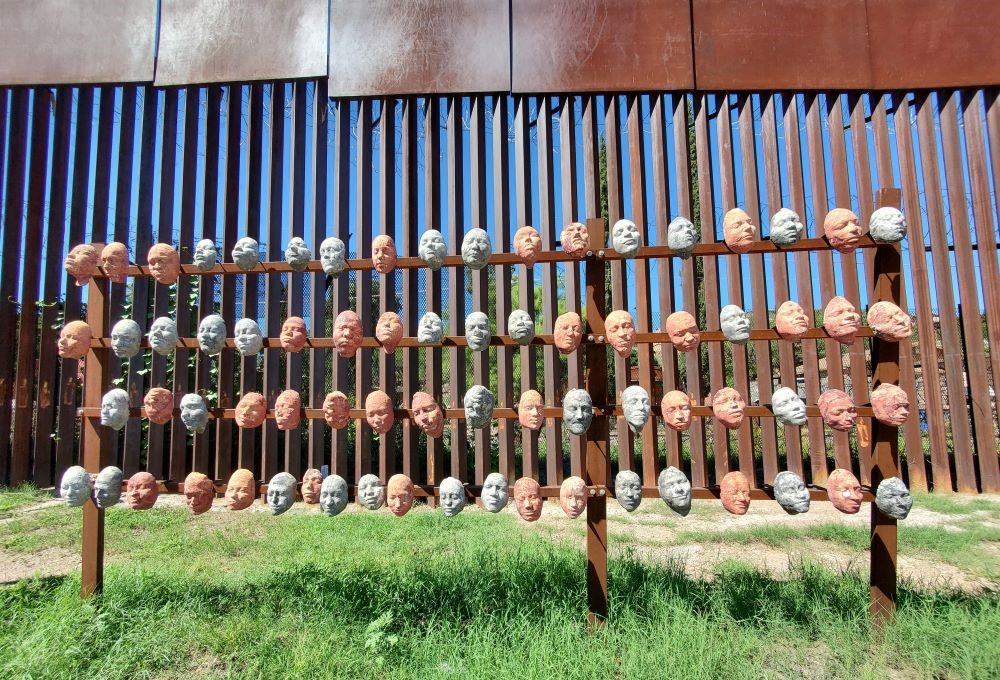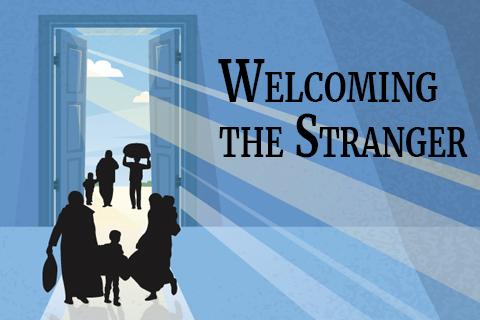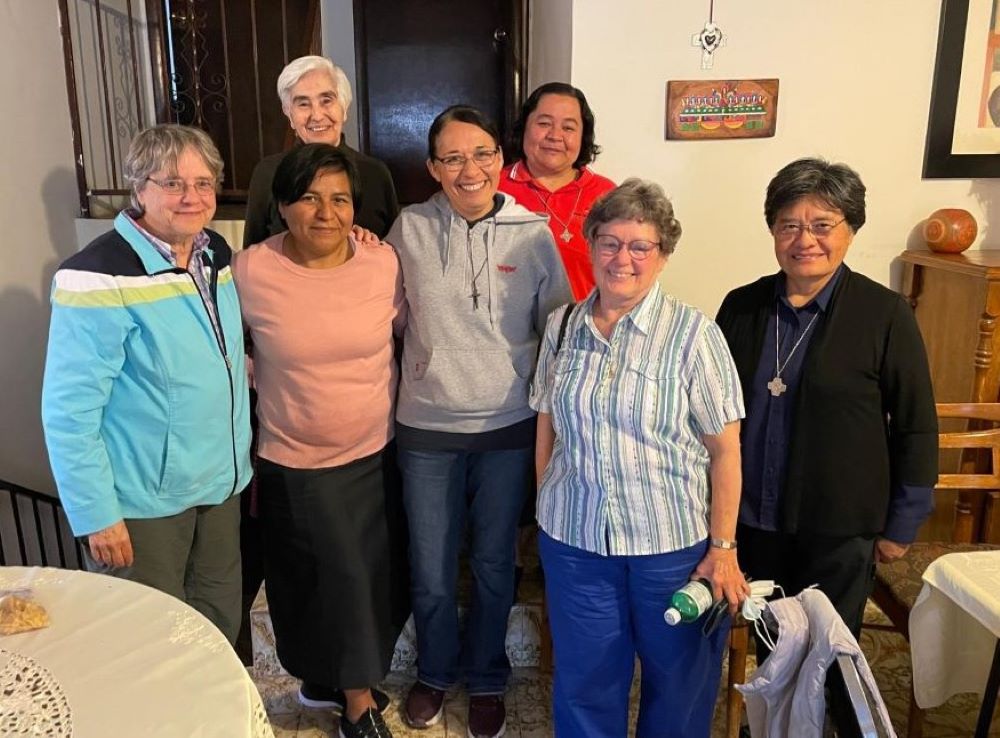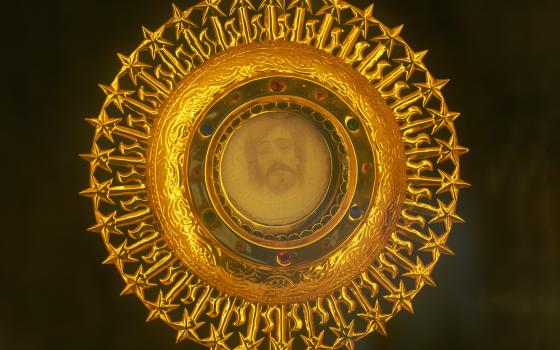
Sculpted papier-maché faces hang on the border wall in Nogales Sonora, Mexico. (Courtesy of Eileen McKenzie)
Editor's note: Global Sisters Report's series, "Welcoming the Stranger," takes a closer look at women religious working with immigrants and migrants. While we cover this topic often, this series features sisters and organizations networking to better serve those crossing borders, global migration trends and the topic of the issue of immigration in the upcoming U.S. presidential election.

While listening to the political rhetoric this campaign season, it is difficult to keep in mind that migration is a common occurrence in creation and has, in fact, always been part of the human experience. We look upon the migratory patterns of butterflies and caribou and resonate with the beauty and awe of creation. We see geese and hummingbirds fly south in order to survive and we are prompted to think, sometimes nostalgically, of the changing seasons as we prepare for winter. When we see people moving north in order to survive, we are instead prompted to think of danger, crime, scarcity and we prepare by closing border crossings and building walls.
Americans participated in a notable election yesterday (Nov. 5), and our national leaders offer little support for families forcibly displaced from their homes in other countries who seek safety here. Even as Catholics, we feel conflicted about recognizing this as a choice for life. Campaign rhetoric that is racist, dehumanizing, describes the criminalization of migration and focuses on southern border security says little about our identity as a nation of immigrants. It says even less about compassion, freedom, human dignity and equality of opportunity — values that Americans have traditionally held dear. No wonder Pope Francis recently called out both political U.S. presidential candidates as "against life."
Our church tradition and teaching, however, stand in stark contrast to this rhetoric. The vision of the U.S. Conference of Catholic Bishops in "Welcoming the Stranger Among Us: Unity in Diversity" is just as important today as when it was published 24 years ago. Recognizing the challenge of ethnic and cultural diversity, the church is called to "profound conversion …We reject the anti-immigrant stance that has become popular in different parts of our country, and the nativism, ethnocentrism, and racism that continue to reassert themselves in our communities."
I minister at the Kino Border Initiative, where we welcome migrants at our center in Nogales, Sonora, Mexico, along the Arizona border, supporting them on their journey with dignity. We promote humane, just and workable migration by offering direct humanitarian assistance, holistic accompaniment, and immersive education programs that transform people and communities towards solidarity with migrants and advocacy for their rights. One immersion program we offer is Catholic Sisters Walking with Migrants. I'm blessed to walk with sisters whose encounters have touched them so deeply that they return home committed to transform their communities into places of compassion and communities that welcome the stranger.
Sisters like Jacinta Powers, an Ursuline Sister of Mount St. Joseph and a nurse by training, bring this mission to life. Before she came to Kino, Powers served as the director of nursing services at her motherhouse, then volunteered at a migrant clinic in Matamoros, Mexico. "It was a humbling experience," she shared. Humble is a common word people use when they come to the border.
Sister Jacinta arrived at the border in early March and stayed through Easter. On Holy Thursday, she, along with other migrants in our shelter, had her feet washed by Jesuit discerners. On Good Friday, she walked along the wall, praying the Via Crucis, or Stations of the Cross. On Holy Saturday, she prepared Easter baskets for the children in the shelter and then shared their joy when they received them on Easter Sunday.
She learned about immigration policy and listened to migrants' stories in the shelter. She was immersed in the border culture, walked along trail crossings in Arizona, and listened to ranchers share what it's like to find people lost in the desert. She attended Mass in the shelter, prepared food, served meals, sorted donations and reflected on the Scriptures through the eyes of families forced to flee their homes because of violence, poverty and corruption. She reflected on the Psalms from the perspective of people seeking asylum in the United States. Her accompaniment was generous, humorous and humble.

Participants in the Kino Border Initiative's Catholic Sisters Walking with Migrants program include, front row, from left: Srs. Jacinta Powers, Luz Elena Guzman Vargas, Gabriela Mendez Hernandez, Donna Marie Gribschaw and Alicia Lopez. In back row, from left, are Srs. Engracia Robles Robles and Gladys Cervantes Perez. (Courtesy of Eileen McKenzie)
She left Kino and returned home to Kentucky to continue her walk with migrants. Now she works with Catholic Charities in the Diocese of Owensboro, which is preparing to offer Migration and Refugee Services through the Resettlement Services of the U.S. Conference of Catholic Bishops. "I am passionate about supporting refugees as they start their new lives," she said. "Helping individuals and families from around the world settle into our communities aligns with my values of compassion and inclusion. I want to ensure they have the resources they need to thrive and build a positive future."
Sister Jacinta is one of nearly 30 sisters who have come for immersion at Kino and returned, transformed by the experience, to courageously accompany and advocate for migrants in their home communities. In the past year, these sisters have called on their legislators, written letters to the editor of their local newspapers, engaged in diocesan efforts, sponsored families and, like Sister Jacinta, helped develop programs that welcome, protect, integrate and promote people who become our neighbors, as Pope Francis affirmed on the 104th World Day of Migrants and Refugees.
On Sept. 29 we celebrated the 110th World Day of Migrants and Refugees Pope Francis invited us to reflect upon how powerfully the Spirit works in the lives of people on the move, as well as those who accompany them. He calls us to see migrants and refugees as "a living image of God's people on their way," and reminds us that an encounter with a migrant is an encounter with Christ. His message calls the church "to rediscover its itinerant nature, as the People of God journeying through history on pilgrimage, 'migrating', we could say, toward the Kingdom of Heaven." According to the International Organization for Migration, in 2020, the estimated number of international migrants in the world was 281 million and continues to grow.
There are so many opportunities to encounter Christ!
How have you encountered Christ in people on the move lately?
Advertisement





